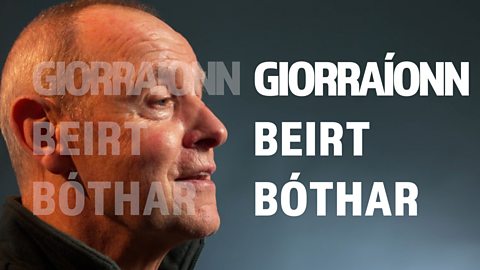GiorraÃonn Beirt Bóthar

GiorraÃonn Beirt Bóthar
Two Shorten the Road
If you have a ‘cúpla focal’;
Two people shorten the road
This means when a person is travelling, the journey seems shorter if he is travelling with another.
The sequence of the sentence is simple – verb, subject, object.
There are two long vowels in this sentence indicated by a length mark (síneadh fada) on each. The ‘í’ is pronounced like the ‘e ‘ in ‘be’. The ‘ó’ is pronounced either as the ‘aw’ in ‘law’ or the ‘ow’ in ‘low’.
The ‘io’ in ‘giorraíonn’ and ‘ei’ in ‘beirt’ are mixed vowels, and the first vowel in each is the more pronounced.
The ‘a’ in ‘bóthar’ is in an unstressed position and is known as a neutral vowel sounding like the ‘e’ in ‘the’.
‘th’ is sounded as ‘h’ in ‘he’.
‘Giorraíonn’ is the present tense, third person, of the verb ‘giorraigh’ (shorten’).
If you’re an advanced learner;
Giorraíonn beirt bóthar

Two people shorten the road
This proverb means that a journey appears shorter if one has another person for company.
The verb ‘giorraíonn’ is the present tense, third person, of the verb ‘giorraigh’ (shorten) and is a verb of the second conjugation as it has more than one syllable and ends in ‘-igh’.
We see that ‘beirt’ is the noun used to express ‘two people’, as opposed to ‘dó’ the word for ‘two’ when it is not followed by a noun and ‘dhá’ which precedes a noun.
The word ‘bóthar’ is a masculine noun as indicated by the final broad consonant ‘-ar’.
If you’re fluent but would like to improve your grammar;
Giorraíonn beirt bóthar
Is cuma cad é an turas a bhfuil tú air, turas de shiúl na gcos nó turas i gcarr, ar bhus, ar thraein, ar eitleán, bíonn cuma níos giorra ar an turas má bhíonn cuideachta mhaith agat.
Is é ‘giorraíonn’ an aimsir láithreach tríú pearsa den bhriathar ‘giorraigh’, briathar atá sa dara réimniú ó tharla é a bheith ilsiollach agus ‘-igh’ ina dheireadh. Ta gaol aige leis an aidiacht ‘gairid’.
Tabhair faoi deara ‘beirt’ ag tagairt do dhaoine.
Ta ceithre chineál uimhreacha sa Ghaeilge:
- maoluimhreacha i.e uimhreacha nach bhfuil ainmfhocal ar a lorg – aon, dó, trí, ceathair etc.
- bunuimhreacha – uimhreacha a bhfuil ainmfhocal ar a lorg – aon mhála amháin, dhá mhála, trí mhála, ceithre mhála etc.
- uimhreacha pearsanta – ag tagairt do dhaoine – duine amháin, beirt, triúr, ceathrar etc.
- orduimhreacha - ag cur rudaí, daoine in ord – an chéad duine, an dara duine, an tríú duine, an ceathrú duine etc.
‘Bóthar’, is ainmfhocal firinscneach é. Faigheann muid leid air sin ón chonsan dheireanach san fhocal atá leathan ‘-ar’.
Is ainmfhocal baininscneach ‘beirt’ agus dá bharr sin bíonn séimhiú air nuair a leanann sé an t-alt > an bheirt. Chomh maith leis sin má tá ainmfhocal ar a lorg a cháilíonn é, cuirtear séimhiú ar thúschonsan an ainmfhocail sin agus bíonn sé sa ghinideach iolra > beirt fhear, beirt bhan, beirt pháistí, beirt mhúinteoirí.